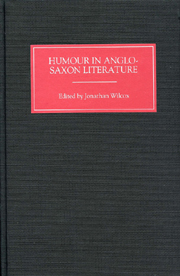Book contents
- Frontmatter
- Contents
- Contributors
- Acknowledgements
- Introduction
- Byrhtnoth's Laughter and the Poetics of Gesture
- ‘Grim Wordplay’: Folly and Wisdom in Anglo-Saxon Humor
- Humor, Wordplay, and Semantic Resonance in Beowulf
- Heroic Humor in Beowulf
- Humor in Hiding: Laughter Between the Sheets in the Exeter Book Riddles
- Sexual Humor and Fettered Desire in Exeter Book Riddle 12
- ‘Why do you speak so much foolishness?’ Gender, Humor, and Discourse in Ælfric's Lives of Saints
- A Funny Thing Happened on the Way to Heaven: Humorous Incongruity in Old English Saints' Lives
- Index
A Funny Thing Happened on the Way to Heaven: Humorous Incongruity in Old English Saints' Lives
Published online by Cambridge University Press: 12 September 2012
- Frontmatter
- Contents
- Contributors
- Acknowledgements
- Introduction
- Byrhtnoth's Laughter and the Poetics of Gesture
- ‘Grim Wordplay’: Folly and Wisdom in Anglo-Saxon Humor
- Humor, Wordplay, and Semantic Resonance in Beowulf
- Heroic Humor in Beowulf
- Humor in Hiding: Laughter Between the Sheets in the Exeter Book Riddles
- Sexual Humor and Fettered Desire in Exeter Book Riddle 12
- ‘Why do you speak so much foolishness?’ Gender, Humor, and Discourse in Ælfric's Lives of Saints
- A Funny Thing Happened on the Way to Heaven: Humorous Incongruity in Old English Saints' Lives
- Index
Summary
The importance of incongruity as a defining quality of humor is widely recognized by theorists and has been referred to already in this book. In incongruity, which may be purely intellectual, as in punning and verbal irony, or may also involve some kind of human interest, as in farce or comedies of errors, experience contradicts expectation; a lack of fit is perceived between elements which are surprisingly brought together.
Incongruity is in the eye of the beholder, so to speak, and so one of the problems of studying humor from a distant period, such as that of Anglo-Saxon England, is that it is difficult to be sure whether what strikes a modern reader as humorous would have been so to original audiences and readers. How can we tell whether something was designed to be humorous or not, or would have been taken as humorous by people at the time? In general, however, it is reasonable to say that the Anglo-Saxons clearly did appreciate humorous incongruity and took pleasure in unlikely correspondences and juxtapositions. Much of the enjoyment of the riddle form, a type of literature especially associated with Anglo-Saxon England, comes from the witty expression of apparent incongruity: the Exeter Book riddles refer, for example, to a mouthless creature singing at the mead-bench (a reed pipe, Riddle 60); an excellent garment but not made of fabric (a coat of mail, Riddle 35); a moth that eats words (a bookworm, Riddle 47); and so on. They ingeniously exploit paradox and seeming self-contradiction, teasing the reader towards pleasurable recognition of discrepancy.
- Type
- Chapter
- Information
- Humour in Anglo-Saxon Literature , pp. 137 - 158Publisher: Boydell & BrewerPrint publication year: 2000



